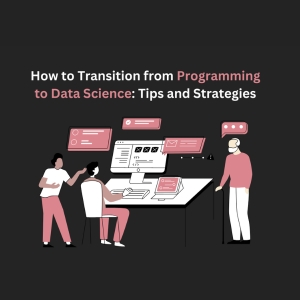How to Transition from Programming to Data Science: Tips and StrategiesPosted by Atul on August 31st, 2023  What is Data ScienceMaking the transition from programming to data science can seem daunting, but with the right tools and strategies, anyone can make the move. Data science is a growing profession that relies heavily on programming knowledge, so having a background in coding is essential for success. The following tips will help you learn how to transition from programming to data science. First, it’s important to gain an understanding of what data science entails. It requires strong analytical skills and deep knowledge of Math & statistics. This means you’ll need to stay updated on mathematical concepts like linear algebra, calculus, and probability theory. Additionally, problem solving skills are key since data scientists often have to develop their own solutions when faced with complex problems. In addition to having a strong theoretical background in programming and mathematics, it’s essential that you have practical experience working with large datasets and different types of tools. Thankfully there are plenty of online courses and certifications that can help you develop your knowledge base in this area. Taking an online course or getting certified is a great way to enhance your qualifications as a data scientist while also familiarizing yourself with key concepts and best practices in the field. Finally, don’t forget about mentorship when transitioning from programming to data science. Finding someone who is experienced in the field can be invaluable in helping you navigate the world of big data analytics and machine learning algorithms. Seek out advisors who can provide guidance on which classes or certifications will be most beneficial for your career goals and offer their insights into tackling complicated problems using code. Skills Needed for Data ScienceTo help get you started on your journey, here are some key tips and strategies to consider when transitioning from programming to data science.Programming Basics:Having a strong foundation in programming basics is essential for success in any data science role. By mastering languages such as Python, R, Java, and SQL, you’ll be able to gain a better understanding of how to work with datasets, manipulate them in order for efficient analysis, and develop algorithms that can draw meaningful insights from the data. Math & Statistics:In addition to having strong programming knowledge, math and statistics are must haves for any successful data scientist. Familiarity with linear algebra techniques and probability theory will help you understand the underlying structures behind datasets and create predictive models that enable real world applications of your insights. Additionally, having a good grasp on descriptive analytics like mapping distributions or plotting correlations can help you identify trends more quickly. Data Wrangling:Manipulating unstructured or messy datasets into well defined formats is a key skill for any aspiring data scientist. Data wrangling involves transforming raw datasets into formats that can be used by downstream systems or for further analysis by yourself or other stakeholders. Knowing how to work with different sources of data – including CSV files, SQL databases, JSON documents – as well as working with APIs will give you an unparalleled ability to make sense of the vast amounts of available information out there. Transitioning from Programming to Data ScienceOne of the most important aspects of transitioning from programming to data science is honing your existing programming skills. Having a strong understanding and background in languages like Java, Python, or R are essential for success in the field of data science. Not only that, but also having an understanding of different programming paradigms like object oriented and functional is also beneficial for making the transition. Familiarizing yourself with different coding patterns will help you transition quickly from one language to another as needed in your job as a data scientist. In addition to honing your programming skills there are several concepts you should understand when transitioning into a career in data science. Understanding fundamental concepts such as machine learning algorithms, Bayesian inference methods, supervised and unsupervised learning approaches are essential for success in this field. Additionally, gaining an understanding of key theoretical concepts such as statistics and probability theory will help you make logical decisions when creating models and algorithms for your projects. Gaining Experience in the Field of Data ScienceGaining experience in the field of data science is no small feat – it requires a combination of research, education, networking, and handson experience. To understand the necessary skills and knowledge for a successful transition from programming to data science, we’ll cover each component in depth. First off, on the research and education front, having a good understanding of business analysis and machine learning; data visualization and communication; automation and big data; programming languages such as Python, R, and SQL; as well as statistics are key components for any aspiring data scientist. Make sure to read up on these topics through books, conferences, online courses, or self learning projects. Next up is networking with professionals currently working in the field of data science. This could be done by attending conferences or meetups related to data science or joining professional organizations like Data Science Society or Forbes Technology Council. Networking will help you build valuable connections within the industry that could potentially lead to internships or job opportunities. Once you have gained enough experience in programming languages such as Python, R & SQL and understand basic concepts such as business analysis & machine learning thoroughly – practicing handson projects is essential for any aspiring programmer turned data scientist. Experimenting with tools like Tableau or RapidMiner can help bring data to life with advanced visualizations and refine your analysis practice at the same time. Data Science Training In Bangalore Study Resources and Training Materials for Transitions To get you started, developing your technical skills should be at the top of your list. Invest some time into learning languages such as R or Python and strengthening your coding abilities. Both are excellent tools for handling data manipulation and analysis. In addition to using programming languages, having an understanding of domain knowledge is also crucial for success in data science. On top of learning how to code in these languages, you would need to have a strong understanding of mathematics, including calculus; probability; statistics; linear algebra; and machine learning techniques – all fields essential for working with large amounts of data sets. Data visualization and storytelling are also key parts of being a successful data scientist – it is almost impossible to convey insights accurately without mastering them first. You can learn how to communicate effectively through quantitative methods while helping yourself develop better ways of interpreting complex datasets using visualization tools such as Tableau or PowerBI. Statistics and probability fundamentals are essential for being well versed in the field of analytics too, so don’t forget these when transitioning from programming into the world of data science. You should also hone your problem solving skills by practicing machine learning techniques that will help you build models which can accurately predict outcomes over large datasets efficiently. Data Science Colleges In Mumbai Assessing If You are Ready for a Career Change into Data ScienceThe first step is analyzing your current skill set. What existing knowledge and experience do you already possess in the field of programming? Identifying your proficiency gaps will give you an idea of how much additional learning and practice are necessary for you to successfully transition into data science. It’s important that you familiarize yourself with the tools and techniques associated with data science. Researching popular software packages used by machine learning engineers, as well as analytics platforms like Hadoop, is key in order to start mastering these technologies. Moreover, connecting with professionals working in the data science field can help you get uptodate insight on topics like trends in big data and real world applications of analytics tools. Building a professional network through social media sites such as LinkedIn or attending industry events can be a great way to make valuable connections that can aid your career change goals. Once you have identified your knowledge gaps, it's time to take action! Courses from online platforms such as Codecademy or Coursera are excellent resources when it comes to learning new data science skills quickly and conveniently. Data Analytics Courses In India Tips and Strategies to Make an Easy Transition to Data ScienceResearch:Whether you already have experience with programming or you’re just starting out, it’s important to research the in’s and out’s of data science before making a move. Make sure to learn about the tools and technologies associated with data science as well as best practices and emerging trends in the field. You want to be prepared before taking on a new role or task. Developing Soft Skills:One of the most important skill sets that will take your career in data science further is having soft skills like communication and problem solving capabilities. Employers are looking for candidates who can present themselves professionally and thoughtfully approach complex tasks with grace under pressure, so try sharpening these skills while applying for roles within data science. NetworkingBuilding relationships within the industry is also important for landing a job in data science, which is why networking is an essential part of making an easy transition into the field. Whether online or offline, joining communities, taking part in events or just connecting with experienced professionals in your area can all help open up new opportunities for you in data science Practice Projects:Finally, one of the best ways to demonstrate your knowledge and abilities when transitioning into data science is by participating in practice projects using real world datasets or prototyping applications related to your field.
Like it? Share it!More by this author |


